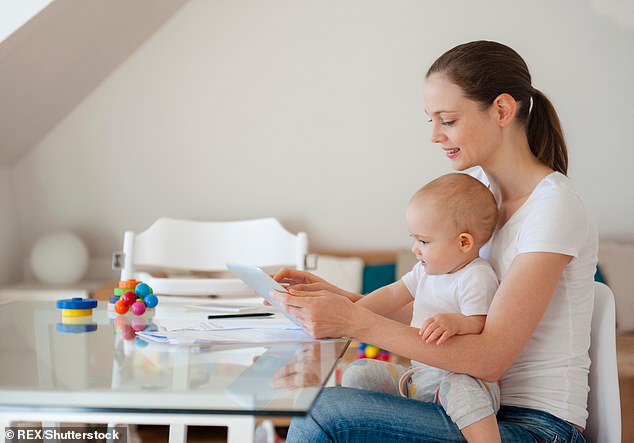Children are less likely to be diagnosed with autism if their parents take part in video-based therapy, a major study has found.
Experts hailed the ‘landmark’ finding, which suggests intervening when the brain is still malleable can improve social development.
The therapy, called iBASIS-VIPP, involves filming a child with early signs of having the spectrum disorder and their parents interacting. Parents then watch the clips with a practitioner to discuss the best ways to help them develop.
British and Australian academics discovered infants treated using the approach were two-thirds less likely to be diagnosed with autism at age three.
It improved the social development of youngsters and their autistic behaviours, such as being sensitive to bright lights and loud noises and repeating themselves.
But it didn’t reverse the developmental difficulties of children who showed signs of having autism as a toddler. Although, researchers said spotting the signs earlier may help them develop.

Researchers in the UK and Australia used a treatment that involves filming babies aged nine to 14 months, who showed early signs of autism, and how they interact with their parents to determine how to best help their development
The study, carried out by researchers at Manchester University and the University of Western Australia, was published in JAMA Pediatrics.
Children are not usually diagnosed with autism until they are three.
Around one in 50 youngsters fall on the spectrum.
They can find it hard to make eye contact, understand how others feel, or have a keen interest in certain topics. Autistic youngsters may also take longer to get their head around information, or repeat things.
Doctors diagnose the disorder by assessing their development, such as when they started talking, watching how they interact with others and reading reports sent by their nursery or school.
Over the course of four years, medics examined 103 babies in Australia aged nine to 14 months who showed early signs of autism.
In babies, it can include not smiling, making eye contact or responding to their name.
Fifty babies received 10 video therapy sessions alongside normal care — which depended on what their doctor recommended. The others weren’t given anything but standard treatment.
What is autism?
Autism Spectrum Disorder (ASD) can cause a wide range of symptoms, which are often grouped into two main categories.
Firstly, problems with social interaction and communication.
This includes difficulty understanding and being aware of other people’s emotions and feelings and/or problems taking part in, or starting, conversations.
Patterns of thought are another key area, namely restricted and repetitive patterns of thought or physical movement, such as hand tapping or twisting, and becoming upset if these set routines are disrupted.
It’s estimated about 1 in every 100 people in the UK has ASD. More boys are diagnosed with it than girls.
There is no cure for ASD, but a range of educational and behavioural support programmes can help people with the condition.
Advertisement
In the iBASIS-VIPP sessions, experts helped parents understand their child’s ability so they could understand how to help them develop socially.
Experts assessed each child the start and end of the study and when they were aged two and three.
The assessments included in-depth examinations of their attention and whether they responded to their name being called and different facial expressions.
Babies given the extra treatment were 68 per cent less likely to meet the diagnostic criteria for autism by the age of three, results showed.
And their autism symptoms — which can include not being able to focus on an object as it moves and being slow to speak — were 28 per cent less severe.
The children who participated in the trial still have developmental difficulties, but iBASIS-VIPP can support them through their early years, the experts said.
The findings back up a smaller trial of the video-based therapy in the UK, which saw similar benefits for children. Experts said it gave them more confidence in the ‘reality of the results’.
Previous autism therapies tried to replace a child’s developmental difficulties with more ‘typical’ behaviours. But iBASIS-VIPP allows a child to learn in the best way for them, researchers said.
The experts said a follow-up study of the participants will be ‘critical’ to determine if there are longer-lasting impacts from the therapy.
The video therapy is already used in the UK for parents of children aged under five who are in adoptive care, to help address their emotional and psychological needs.
Professor Jonathan Green, child psychiatrist at Manchester University, said: ‘iBASIS-VIPP works with each child’s unique differences.
‘And [it] creates a social environment around the child that helps them learn in a way that was best for them.
‘This is the first evidence that a pre-emptive intervention during infancy could lead to such a significant improvement.’
Professor Green added: ‘The children falling below the diagnostic threshold still had developmental difficulties.
‘But by working with each child’s differences, rather than trying to counter them, the therapy has effectively supported their development through early childhood.
‘With this therapy we are providing support before a diagnosis is given – and parents overwhelmingly want this.
‘This evidence could have a massive impact on clinical practice and public health – not that many clinical trials have such potential.’
Professor Andrew Whitehouse, based at the University of Western Australia, said the implications of the findings are ‘enormous’.
He said: ‘Interventions commencing during the first two years of life, when the first signs of development difference are observed and the brain is rapidly developing, may lead to even greater impact on developmental outcomes in later childhood.
‘This is a genuine landmark moment for child health research.
‘Our aim is to understand each child’s strengths and challenges so that we can better support and nurture the unique abilities they bring to this world.
‘This is an important step forward in what we hope is an opportunity to develop new clinical models that use very early intervention in babies showing early behavioural signs of autism.’
Source link : https://www.dailymail.co.uk/news/article-10008981/Early-signs-autism-reversed-babies-offered-therapy-help-social-development.html











